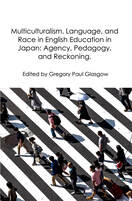Chapter 15: Teaching for Social Justice in Japan: A Sustainable Model by Gerry Yokota
Abstract
To clarify our vision for the direction in which we ought to head in the pursuit of the most equitable education for all, it is imperative for us to have a historical perspective on where we have come from and contextualization to analyze how how far we still have to go. The author provides a retrospective view of her career in Japan to aid in that endeavor. Beginning with a reflection on an anti-racist school festival event that occurred in the 1980s, she proceeds to outline how that formative event influenced her development of a sustainable model of course design and implementation for social justice teaching based on the metaphor of the organic farmer: tilling, planting, watering, weeding, and rotating crops. Each metaphorical stage is illustrated with examples of concrete practices, with a focus on the use of music, poetry, and storytelling to inspire active engagement. Yokota concludes with reflections on the significance of two local anti-racist events that took place in 2020 and 2021.
About the Contributor
Gerry Yokota, Ph.D., taught English at Osaka University for over thirty years before semi-retiring in 2020. She continues to teach in the International College there and at Kansai University and Ritsumeikan University. Her primary approaches to research include multimodality, especially in connection with the representation of gender, and applied cognitive linguistics, both in terms of their general application to intercultural communication and specific application to teaching for peace and social justice.
Citation
Yokota, G. (2023). Teaching for social justice in Japan: A sustainable model. In G. P. Glasgow (Ed.), Multiculturalism, language, and race in English education in Japan: Agency, pedagogy, and reckoning (pp. 362–281). Candlin & Mynard ePublishing. https://doi.org/10.47908/26/15
To clarify our vision for the direction in which we ought to head in the pursuit of the most equitable education for all, it is imperative for us to have a historical perspective on where we have come from and contextualization to analyze how how far we still have to go. The author provides a retrospective view of her career in Japan to aid in that endeavor. Beginning with a reflection on an anti-racist school festival event that occurred in the 1980s, she proceeds to outline how that formative event influenced her development of a sustainable model of course design and implementation for social justice teaching based on the metaphor of the organic farmer: tilling, planting, watering, weeding, and rotating crops. Each metaphorical stage is illustrated with examples of concrete practices, with a focus on the use of music, poetry, and storytelling to inspire active engagement. Yokota concludes with reflections on the significance of two local anti-racist events that took place in 2020 and 2021.
About the Contributor
Gerry Yokota, Ph.D., taught English at Osaka University for over thirty years before semi-retiring in 2020. She continues to teach in the International College there and at Kansai University and Ritsumeikan University. Her primary approaches to research include multimodality, especially in connection with the representation of gender, and applied cognitive linguistics, both in terms of their general application to intercultural communication and specific application to teaching for peace and social justice.
Citation
Yokota, G. (2023). Teaching for social justice in Japan: A sustainable model. In G. P. Glasgow (Ed.), Multiculturalism, language, and race in English education in Japan: Agency, pedagogy, and reckoning (pp. 362–281). Candlin & Mynard ePublishing. https://doi.org/10.47908/26/15

Information About the Book
Title: Multiculturalism, Language, and Race in English Education in Japan: Agency, Pedagogy, and Reckoning
Editor: Gregory Paul Glasgow
Publication date: March 2023
Read more...
Title: Multiculturalism, Language, and Race in English Education in Japan: Agency, Pedagogy, and Reckoning
Editor: Gregory Paul Glasgow
Publication date: March 2023
Read more...
